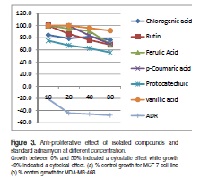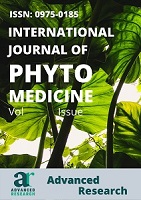Antioxidative and antiproliferative activities of isolated compounds from Prunus domestica: an in vitro study
Keywords:
Prunus domestica, antioxidant, antiproliferative, DPPH, human breast cancer cell linesAbstract
In this investigation the antioxidant as well as antiproliferative activities of different isolated compounds from ethyl acetate fraction of Prunus domestica (peel + flesh) were studied in two human breast cancer cell lines, MCF-7 and MDA-MB-468. Free radical scavengering as done with 2, 2-diphenyl-1-picrylhydrazyl (DPPH) study indicated different degrees of antioxidative activity of the isolated compounds such as chlorogenic acid, protocatechuic acid, vanillic acid, ferulic acid, p-coumaric acid and rutin. However maximum antioxidative activity was observed in chlorogenic acid with IC50 of 0.115 mg/ml. With respect to antiproliferative potential, chlorogenic acid also exhibited the maximum antiproliferative activity on MCF-7 and protocatechuic acid on MDA-MB-468 human breast cancer cell lines. This appears to be the first report that provides a comparative account on the antioxidant and antiproliferative property of some isolated active compounds of the Indian variety of fruit, Prunus domestica.
References
Waris G, Ahsan H. Reactive oxygen species: role in the development of cancer and various chronic conditions. Journal of Carcinogenesis 2006. 5: 1-8.
. Barbosa KBF, Bressan J, Zulet MA, Martínez JA. Influence of dietary intake on plasma biomarkers of oxidative stress in humans. An. Sist. Sanit. Navar 2008.31: 259-280.
. Parmar HS, Kar A. Comparative analysis of free radical scavenging potential of several fruit peel extracts by in vitro methods. Drug Discov Ther. 2009. 3:49-55.
. Panda S, Kar A, Sharma P, Sharma A. Cardioprotective potential of N, α-l- rhamnopyranosyl vincosamide, an indole alkaloid, isolated from the leaves of Moringa oleifera in isoproterenol induced cardiotoxic rats: In vivo and in vitro studies. Bioorg Med Chem Lett. 2013. 23:959-962.
. Trease WC. Trease and Evans Pharmacognosy. W.B. Saunders, New York, USA. 2002.
. Nagarajan GR, Parmar VS. Phloracetophenone derivatives in Prunus domestica. Phytochemistry 1977;16: 614-615.
. Jennifer LD, Anne SM, Andrew L. Waterhouse; Phenolic Composition and Antioxidant Activity of Prunes and Prune Juice (Prunus domestica). J. Agric. Food Chem 1996.46: 1247-1252.
. Shin-Ichi K, Naoko FY, Tomoo S, Takao I, Kochiro S, Hiroe K, Takahiko M, Nobuji N. Quantitative Evaluation of Antioxidant Components in Prunes (Prunus domestica L.). J. Agric. Food Chem 2003.51:1480-1485.
. Murcia MA, Jiménez AM, Martínez-Tomé M. Evaluation of the Antioxidant Properties of Mediterranean and Tropical Fruits Compared with Common Food Additives. J Food Prot 2001. 64: 2037-2046.
. Giuliana N, Weston P, David B, Luis C. Identifying peach and plum polyphenols with chemopreventive potential against estrogen-independent breast cancer cells. J. Agric. Food Chem 2009.57: 5219–5226.
. Nedime D, Seckin O, Esra U, Yasar D, Mustafa K. The Isolation of Carboxylic Acids from the Flowers of Delphinium formosum. Turk J Chem 2001.25: 93-97.
. Tianzhi C, Wen Q, Lianmei Y, Guangzhong T, Rong Y, Kehui X, Hongzheng F. Chemical constituents of Pseudolarix kaempferi Gord. Journal of Chinese Pharmaceutical Sciences 2012. 21: 428–435.
. Jutamas J, Piyarat G, Valery VF, Opa V. From Bace1 inhibitor to multifunctionality of tryptoline and tryptamine triazole derivatives for alzheimer’s disease. Molecules 2012.17: 8312-8333.
. Funayama S, Hikino H. Hypotensive principles of Diospyros kaki leaves. Chem Pharm Bull 1979. 27: 2868.
. Skehn P, Storeng R, Scudiero A, Monks J, McMohan D, Vistica D, Jonathan TW, Bokesch H, Kenney S, Boyd MR, New Colorimetric Cytotoxicity Assay for Anticancer-Drug Screening. J Natl Cancer Ins. 1990.82: 1112.
. Tsai J, Huang G, Chiu T, Huang S, Huang S, Huang T, Lai S, Lee C. Antioxidant activities of phenolic components from various plants of Desmodium species. African Journal of Pharmacy and Pharmacology 2011. 5: 468-476.
. Yi B, Lifei H, Wenli M, Kaibing Z, Hui W, Ying L, Xiaoyi W, Haofu D. Antioxidant Phenolic Compounds of Cassava (Manihot esculenta) from Hainan. Molecules 2010. 16: 10157-10167.
. Keawsaard S, Natakankitkul S, Liawruangrath S, Teerawutgulrag A , Trisuwan K , Charoenying P, Pyne S, Liawruangrath B. Anticancer and antibacterial activities of the isolated compounds from Solanum spirale Roxb. leaves. Chiang Mai J. Sci. 2012. 39: 445-454.
. Joshi G, Sultana R, Jitbanjong T, Cole MP, Daret C, Mary V, Steven E, Allan B. Free radical mediated oxidative stress and toxic side effects in brain induced by the anti-cancer drug adriamycin: Insight into chemobrain. Free Radical Research 2005. 39: 1147–1154.



